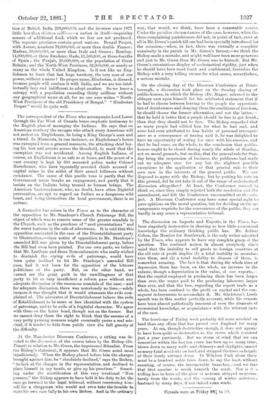A discussion has arisen in the Times as to the
character of the oppositiou to Mr. Stanhope's Church Patronage Bill, the object of which was to remove some of the greater scandals in the Church, such as the purchase of " next presentations " and the worst features in the sale of advowsons. It is said that this opposition amounted in the case of the Disestablishment party to Obstruction,—since notice of opposition to Mr. Stanhope's amended. Bill was given by the Disestablishment party, before the Bill had even been printed. For our own parts, we believe that Mr. Leatham and those Nonconformists who really wished to diminish the crying evils of patronage, would have been quite inclined to let Mr. Stanhope's amended Bill pass, had it not been for the opposition of the bitterer politicians of the party. Bnt, on the other hand, we cannot see the great guilt in the unwillingness of that party to let so very insufficient a reform pass without any -adequate discussion of the enormous scandals of the case,—and for adequate discussion, there was notoriously no time,—solely because it was thought that it would attenuate the evils com- plained. of. The advocates of Disestablishment believe the evils -of Establishment to be more or less identified with the system of patronage, and to be evils of a frightful character. We agree with them on the latter head, though not on the former. But we cannot deny them the right to think that the success of a very petty pruning measure might eventually prove a real mis- chief, if it tended to hide from public view the full gravity of the difficulty.


































 Previous page
Previous page